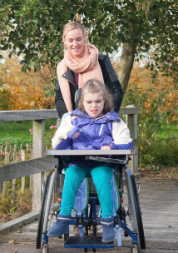Report: unheard carers from minority groups in North Somerset

This research was conducted ahead of the publication of North Somerset Council's Carers Strategy. We looked at how carers from minority communities see their role when looking after a loved one, what their health and social care needs are, and how these needs make them vulnerable and in need of support.
We spoke to people from Traveller communities, Asian communities, Syrian refugees, and people with a disability themselves.
They told us they had not received clear information about their rights and entitlement to support, or information about how to access public services. None were supported by their GP or GP surgeries, and no health or social care professional had ever discussed with them their role as a carer.
"I don’t see myself as a carer for my daughter. I am her mother, and she is part of my heart. I don’t identify myself as a carer".
You can download a copy of our report below.
Downloads
Key findings
- Participants do not identify themselves as unpaid carers. They felt unacknowledged by GPs and other frontline health and social care services.
- The lack of information or communication directed at them from health and social care services is the main barrier to accessing the support these carers need.
- Carers would like training so that they can better support the cared-for person, and emotional support for themselves. This was especially true for refugee carers.
- The carers wanted peer support groups with other carers who face similar barriers or provide a similar type of care.
- Uptake of services by diverse communities (and better health outcomes) would be improved by gaining a better understanding of the key issues relating to culture and how this may influence use of health and support services.
Our recommendations include that health and social care services build their cultural understanding to achieve strong, positive networks with minority community, language-based and faith-based groups in North Somerset in order to engage and identify carers from vulnerable communities and groups.
Advice and signposting information should also include an explanation of the word carer, such as: ‘if you look after someone who couldn’t manage without your help, you are a carer and you have the right to access support for yourself.'
Shane Devlin, Chief Executive Officer of the Bristol, North Somerset and South Gloucestershire Integrated Care Board, said: "We welcome the report’s findings and recommendations. Tackling inequalities in health outcomes, experience, and access to services across the whole of Bristol, North Somerset and South Gloucestershire is a key priority for the Integrated Care System (ICS); and as part of this, it is important we look at how we can improve the experience of carers, particularly those from minority communities."
We will continue to work closely with North Somerset Council and other partners to tackle inequalities and support communities at a local level. We will share the report with North Somerset – and other - Locality Partnerships so that we can build on the great work Healthwatch is doing to develop relationships with carers and unheard communities.
Kathryn Benjamin, North Somerset Council Strategy and Policy Development Officer, Adult Social Services and author of the North Somerset Carers Strategy 2021-24, said: "We note the clear recommendations of the report and will use these to inform the action plan for the multi-agency North Somerset Carers Strategy. We will also share these recommendations within the council and work with the Integrated Care System and other partners, as their implementation requires an integrated approach which spans across health, social care, and the voluntary sector, to improve outcomes for these carers in our community."
Are you a cared-for person or a carer living in North Somerset? What do you think about the support you have received from local health and social care services? Click the pink 'Talk to us' button below and share your experience by completing our feedback form.

